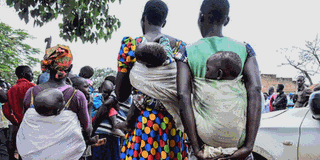Over 20 girls rescued from forced marriages in Rakai

Teenage mothers with their babies in Teobia Village, Kole District, on November 16 last year. Many girls across the country did not return to school last month after getting married during the Covid-19 lockdown. PHOTO/FILE
What you need to know:
- Forced marriages in several communities in Rakai and Kyotera are looked at as a normal cultural practice.
In December 2020, Asiimwe was married off by her parents in Kyarurangira Sub-county, Rakai District, at the age of 13.
Asiimwe’s partner was asked to pay bride price in form of 50 cows to her parents.
The traditional marriage was planned without her consent. Barely two months into the forced marriage, child rights’ activists intervened to rescue Asiimwe .
“It is part of our culture and when you refuse to go with the man, you are isolated and called all sorts of names,” a tearful Asiimwe said in an interview last week.
Asiimwe’s case is one of many other increasing cases of early marriages.
Children rights’ activists and cultural leaders in Rakai District have now teamed up to step up the campaign against forced child marriages in the area.
Forced marriages in Kyotera and Rakai districts are a phenomenon, particularly among cattle rearing communities who regard it as a treasured cultural practice.
According to Ms Cynthia Rukundo, the advocacy and communications officer at Brick by Brick, a child rights’ organisation, they have managed to rescue 20 girls between the ages of 13 and 17 from forced marriages in a space of five months.
“We have done this with the help of youth leaders in Rakai who identify these families. We aim at sensitising these communities so that this outdated practice becomes history,” she said at the weekend.
Ms Rukundo added that cases of forced child marriages are most prevalent in the sub-counties of Kyarurangira, Kibanda, Kiziba, Kacheera and Kifamba in Rakai District.
She added that many of the victims are married off without their consent during ceremonies clandestinely arranged by their biological parents and some local leaders.
“We have come to realise that when such marriages are being arranged, the parties involved ensure that police don’t know about their plans. These teenagers are taken away and hidden far away from their homes and such cases fail to proceed to court due to lack of evidence,” Ms Rukundo explained.
Queen picks interest
The queen (Omugo) of Kooki cultural institution, Ms Rebecca Tulituuka, recently told Daily Monitor in an interview that the institution is trying hard to fight some primitive and immoral cultural practices, which affect the girl child.
“As an institution, we are working with other child rights’ organisations to sensitise our communities and stop such practices,” she said.
Mr Godfrey Abaho, a resident of Rwabaganda Village in Ddyango Town Council, Rakai District, said their culture of early marriages as ethnic muhima should be respected.
“It’s not a forced marriage as people allege; it is instead a traditional norm which we treasure. We, therefore, have no way we can allow our norm to fade away,” he said.
Ms Rukundo said they have already made arrangements with the Kooki cultural institution officials on how to engage these communities to stop forced early marriages.
She added that according to their findings, the parents in the cattle rearing communities look at girls as a source of income and they see no reason for taking them to school.
Mr Joseph Ssendagi, the Rakai District probation officer, said in the sub-counties where forced child marriages are rampant, local leaders consider it a normal practice.
“They totally conceal information about the parties involved thus failing our efforts to help the victims,” he said.
Mr Allan Musasire, a lawyer who is also the Rakai youth chairperson, said in such scenarios, those involved, if proven guilty, can be charged with abduction and rape.
Prevalence
According to United Nations Children’s Emergency Fund (Unicef), Uganda has the 16th highest prevalence rate of child marriage in the world and the 10th highest absolute number of child brides globally. In Uganda, 10 per cent of girls are married before 15 years and 40 per cent are married by the age of 18.
Justified as an accepted norm with social and financial benefits, child marriage has little or no benefit for the young girls themselves, who are more vulnerable to domestic violence, more likely to be uneducated, at greater risk of contracting HIV/Aids, and more likely to bear children before they are physically ready.
However, many countries had made progress against such traditional and transactional marriages of girls in recent decades, but the Covid-19 economic havoc has caused significant backsliding.
The United Nations estimates that hardships resulting from Covid-19 will drive 13 million more girls to marry before the age of 18.
Article 31(section 3) of the Constitution stipulates that marriage shall be entered into with the free consent of the man and woman intending to marry while Article 33(section 6) of the same law indicates that laws, customs or traditions which are against the dignity of women are prohibited .
According to the Penal Code Act, 2007, any person who attempts to perform a sexual act with another person who is below the age of 18 years is liable to imprisonment not exceeding 18 years.




